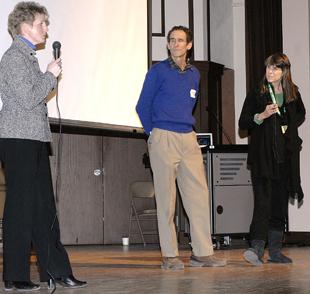
© Fred Schulze/Winona Daily NewsAngie Tagtow, left, David Cavagnaro, center, and Deborah Koons Garcia answer questions about their presentation during the Frozen River Film Festival on Sunday at Winona State University.
Most Americans don't consider soil more valuable than oil, but filmmaker Deborah Koons Garcia wants them to think otherwise.
Garcia - widow of the late Grateful Dead guitarist Jerry Garcia - spoke in Winona, Minnesota on Sunday afternoon during the final day of the Frozen River Film Festival, and previewed her upcoming film on the relationship between healthy soil and healthy people. The preview suggested that while emerging technologies may replace oil as the fuel of the future, soil is irreplaceable - and increasingly at risk.
Erosion, sprawling development and short-sighted farming techniques are imperiling America's best dirt, including the soil that supports agriculture in the Upper Midwest, said Garcia and other food experts at Sunday's panel discussion. That loss and degradation of soil, in turn, drains the nutrients needed to continue growing healthy food for years to come, the speakers suggested

Comment: When a government is run by the rich elite (big agriculture for one), you can forget about said government caring one iota for the health and welfare of the people. They care only for profit and power.
So if you want to be healthy, you pay more taxes!